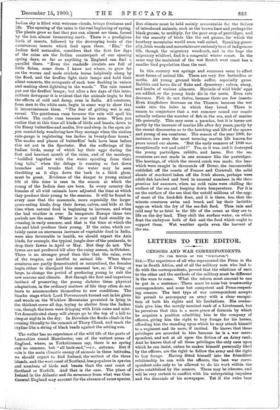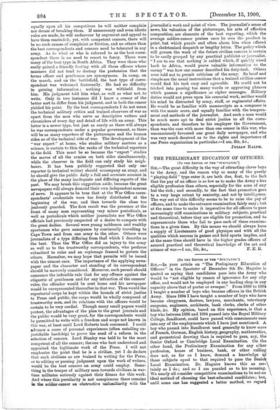LETTERS TO THE EDITOR.
CENSORS AND WAR CORRESPONDENTS.
[TO THE EDITOR OF THE "SPECTATOR."]
SIR,—The experience of all who represented the Press in the war in South Africa, and of all the military men who had to do with the correspondents, proved that the relations of each to the other and the methods of the military must be different in the wars to come. What the reform must amount to can be put in a sentence There must be none but trustworthy correspondents, and none but competent and Press-respect- ing censors. The best type of war correspondent accepts his permit to accompany an army with a clear recogni• tion of both his rights and his limitations. His creden- tials give him the merely nominal rank of a Lieutenant, but he perceives that this is a mere grace of formula by which he acquires a position admitting him to the company of officers, giving him the right to buy forage for his horses, affording him the standing upon which he may attach himself to a regiment and its mess, if invited. He knows that these privileges are accorded to him because he is a war corre- spondent, and not at all upon the fiction of an Army rank. And he knows that of all these privileges the only ones upon which he can insist, unless he makes himself personally liked by the officers, are the right to follow the army and the right to buy forage. Having fitted himself into the friendliest relationship he can with the officers, the best war corre- spondent asks only to be allowed to do his work within the rules established by the censors. These may be irksome, and will be very certain to conflict with his enterprising impulses and the demands of his newspaper. Yet if the rules bear equally upon all his competitors he will neither complain nor dream of breaking them. If unnecessary and even idiotic rules are made, he will endeavour by argument and appeal to have them rescinded ; yet, with competent censors, there will be no such causes of complaint or friction, and no others than the best correspondents and censors need be tolerated in any army. As to what or who is referred to as the best corre- spondent there is no need to resort to fancy. There were many of the best type in South Africa. They were those who easily gained a friendly footing with all those officers whose manners did not tend to destroy the pretension that the terms officer and gentleman are synonymous. In camp, on the march, and on the battlefield, the best type of corre- spondent was welcomed fraternally. He had no difficulty in gaining information ; nothing was withheld from him. His judgment told him what, as well as what not, to write. Only in two instances did I know a censor of the better sort to differ from his judgment, and in both the censor yielded his point. By the best correspondents I do not mean the technical military critics and trained observers of war as apart from the men who serve as descriptive writers and chroniclers of every day and detail of life with an army. This latter is a newer type, but just as surely as there will always be war correspondents under a popular government, so there will be as many reporters of the picturesque and the human sides as of the technical side of war. The development of the "war expert" at home, who studies military matters as a science, is certain to thin the ranks of the technical reporters in the field. This must be so because the " expert " studies the moves of all the armies on both sides simultaneously, while the observer in the field can only study his neigh- bours. It has been publicly suggested that only one reporter (a technical writer) should accompany an army, and he should give the public daily a full and accurate account in .the place of the many inadequate and differing reports of the past. We may brush this suggestion aside, because the great newspapers will always demand their own independent sources of news. It appears to be true that at the War Office corre- spondents' credentials were too freely distributed at the beginning of the war, and then towards the close too jealously guarded. The first result was the presence at the front of many men representing very minor periodicals, as well as periodicals which neither journalists nor War Office officials had previously suspected of a desire to compete with the great dailies. Several were young noblemen and wealthy sportsmen who gave annoyance by continually travelling to Cape Town and from one army to the other. Others were journalists of a type differing from thai which I describe as the best. Thus the War Office did an injury to the army as well as to the trustworthy correspondents, who perforce submitted to rules and an espionage framed to govern the others. Hereafter, we may hope that permits will be issued with the utmost care. The importance of the applying news- paper and the character and standing of its correspondent should be narrowly considered. Moreover, each permit should announce the inflexible rale that for any offence against the etiquette of gentlemen and for any infraction of the censors' rules, the offender would be sent home and his newspaper would be unrepresented thereafter in that war. Thus would the reportorial corps be kept within the bounds of strict justice to Press and public, the corps would be wholly composed of trustworthy men, and its relations with the_ officers would be certain to be very cordial. Though many small papers would protest, the advantages of the plan to the great journals and the public would be very great, for the correspondents would be permitted to write with a freedom and scope not known in this war, at least until Lord Roberts took command. I could advance a score of personal experiences (often entailing un- justifiable hardship) to prove the need of a reform in the selection of censors. Lord Stanley was held to be the most competent of all the censors; the one who best understood and appraised the legitimate work of the Press. I will not emphasise the point that he is a civilian, yet I do declare that such civilians as are trained to writing for the Press, or to editing or passing judgment upon the work of writers, would be the best censors an army could employ. Some- thing in the temper of military men towards civilians in war- time militates seriously against their fitness for this work. And where this peculiarity is not conspicuous there remains iaa the soldier-censor an obstructive unfamiliarity with the journalist's work and point of view. The journalist's sense of news, his valuation of the picturesque, his arts of effective composition; are elements of the best reporting, which the average soldier-censor praises once he sees the product in print, but which puzzle and often alarm him when offered in a skeletonised despatch or lengthy letter. The policy which will govern the work of the future civilian censors is certain to be easily grasped by any practical publicist'or journalist. "I am to see that nothing is cabled which, if quickly wired back to Africa, would prove valuable information to the enemy " was how one censor described his duty-task. Others were told not to permit criticism of the army. So brief and simple are the usual instructions that a trained civilian censor would find his task easy and agreeable. He could not be tricked into passing too many words or approving phrases which possess a significance as cipher messages. Military duties would not press upon his censorial work, neither would his mind be distracted by army, staff, or regimental affairs. He would be as familiar with manuscripts as a composer is with the music score, and equally familiar with the tempera- ment and methods of the journalist. And such a man would be much more apt to deal strict justice to all the corre- spondents, and therefore to his employer the Government, than was the case with more than one censor in this war, who unconsciously favoured one great daily newspaper, and who was very much deceived as to the rights and importance of one Press organisation in particular.—I am, Sir, &c.,
JULIAN RALPH.















































 Previous page
Previous page